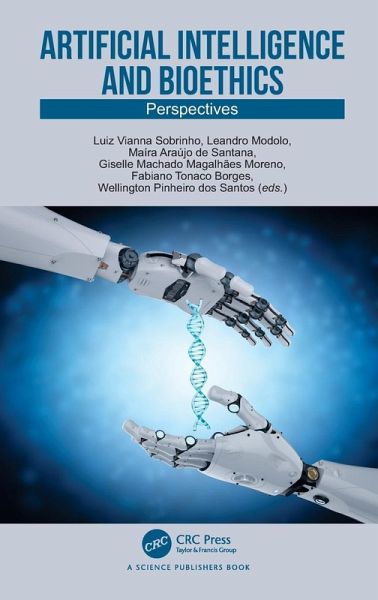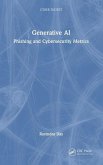Artificial Intelligence and Bioethics
Perspectives
Herausgeber: Tonaco Borges, Fabiano; Santos, Wellington Pinheiro Dos; Araujo de Santana, Maira; Vianna Sobrinho, Luiz; Modolo, Leandro; Machado Magalhaes Moreno, Giselle
Artificial Intelligence and Bioethics
Perspectives
Herausgeber: Tonaco Borges, Fabiano; Santos, Wellington Pinheiro Dos; Araujo de Santana, Maira; Vianna Sobrinho, Luiz; Modolo, Leandro; Machado Magalhaes Moreno, Giselle
- Gebundenes Buch
- Merkliste
- Auf die Merkliste
- Bewerten Bewerten
- Teilen
- Produkt teilen
- Produkterinnerung
- Produkterinnerung
The fourth industrial revolution challenges humanity ethically and morally: mass unemployment, new forms of colonialism, and mass-and-granular surveillance.
Andere Kunden interessierten sich auch für
![Artificial Intelligence for Blockchain and Cybersecurity Powered Iot Applications Artificial Intelligence for Blockchain and Cybersecurity Powered Iot Applications]() Artificial Intelligence for Blockchain and Cybersecurity Powered Iot Applications153,99 €
Artificial Intelligence for Blockchain and Cybersecurity Powered Iot Applications153,99 €![Generative AI Generative AI]() Ravindra DasGenerative AI153,99 €
Ravindra DasGenerative AI153,99 €![Optimal Spending on Cybersecurity Measures Optimal Spending on Cybersecurity Measures]() Tara KissoonOptimal Spending on Cybersecurity Measures155,99 €
Tara KissoonOptimal Spending on Cybersecurity Measures155,99 €![Asset Protection and Security Management Handbook Asset Protection and Security Management Handbook]() James Walsh (ed.)Asset Protection and Security Management Handbook174,99 €
James Walsh (ed.)Asset Protection and Security Management Handbook174,99 €![Investigations in the Workplace Investigations in the Workplace]() Eugene F FerraroInvestigations in the Workplace206,99 €
Eugene F FerraroInvestigations in the Workplace206,99 €![Innovation in Crisis Management Innovation in Crisis Management]() Innovation in Crisis Management174,99 €
Innovation in Crisis Management174,99 €![Investigator's Guide to Steganography Investigator's Guide to Steganography]() Gregory KipperInvestigator's Guide to Steganography137,99 €
Gregory KipperInvestigator's Guide to Steganography137,99 €-
-
-
The fourth industrial revolution challenges humanity ethically and morally: mass unemployment, new forms of colonialism, and mass-and-granular surveillance.
Hinweis: Dieser Artikel kann nur an eine deutsche Lieferadresse ausgeliefert werden.
Hinweis: Dieser Artikel kann nur an eine deutsche Lieferadresse ausgeliefert werden.
Produktdetails
- Produktdetails
- Verlag: Taylor & Francis Ltd
- Seitenzahl: 7
- Erscheinungstermin: 13. Mai 2025
- Englisch
- Abmessung: 234mm x 156mm
- ISBN-13: 9781032657370
- ISBN-10: 1032657375
- Artikelnr.: 72700093
- Herstellerkennzeichnung
- Libri GmbH
- Europaallee 1
- 36244 Bad Hersfeld
- gpsr@libri.de
- Verlag: Taylor & Francis Ltd
- Seitenzahl: 7
- Erscheinungstermin: 13. Mai 2025
- Englisch
- Abmessung: 234mm x 156mm
- ISBN-13: 9781032657370
- ISBN-10: 1032657375
- Artikelnr.: 72700093
- Herstellerkennzeichnung
- Libri GmbH
- Europaallee 1
- 36244 Bad Hersfeld
- gpsr@libri.de
Dr. Luiz Vianna Sobrinho, ScM, PhD, is a Collaborating Professor in the Department of Human Rights and Health at the National School of Public Health Sérgio Arouca/Fiocruz. He completed his postgraduate studies in Cardiology at the Institute of Assistance of Civil Servants of the State of Rio de Janeiro in 1989. In 2020, he earned a PhD in Bioethics and Collective Health from PPGBIOS at the same institution. Dr. Vianna is the author of two technical books: Financial Medicine: The Shattered Ethics (2013) and The Decline of the Clinic - Data Medicine (2021), as well as a book of short stories titled Nine for the Singular (2023). Since 2022, he has been a Postdoctoral Fellow and Invited Scientist at the Center for Social Studies of the University of Coimbra. He is also the co-founder of the Latin-American Strategy for Artificial Intelligence. Dr. Leandro Modolo is a medical sociologist and is currently a guest researcher on the project 'Implications of Digital Technologies for the Health System', which is linked to the Health Tomorrow Initiative/Fiocruz Strategy for the 2030 Agenda. He obtained his doctorate in Social Sciences from the State University of São Paulo (UNESP) and subsequently completed a doctoral scholarship in Collective Health at the State University of Campinas (UNICAMP). He is a member of the Centre for Studies in Economics, Technology and Society (NETS) at the Federal University of Ceará (UFCE) and a regular contributor to the Outra Saúde. Dr Modolo is also a co-founder of the Latin American Artificial Intelligence Strategy. Dr. Maíra Araújo de Santana is a biomedical engineer specializing in artificial intelligence applications in healthcare. She earned her Bachelor's degree in Biomedical Engineering from the Federal University of Pernambuco (UFPE), Brazil, in 2017. During her undergraduate studies, she spent an academic year at the University of Alabama at Birmingham in the United States and worked as a researcher at Duke University's Carl E. Ravin Advanced Imaging Laboratories (RAI Labs), where she developed expertise in medical image processing. Dr. Santana holds a Master's degree in Biomedical Engineering (2020) and a PhD in Computer Engineering (2023) from UFPE. She is currently a postdoctoral researcher and a faculty member in the Specialization in Data Science and Digital Health at the Department of Biomedical Engineering at UFPE. She is a member of the Biomedical Computing Research Group at UFPE, focusing her research on artificial intelligence applied to health. Her work encompasses areas such as pattern recognition for early diagnosis of breast cancer, affective computing, and applied neuroscience. Prof. Giselle Machado Magalhães Moreno is a faculty member in the Biomedical Engineering Department at the Federal University of Pernambuco (UFPE) and a Researcher at the Biomedical Computing Laboratory at UFPE. She earned her Master's degree in Neuropsychiatry and Behavioral Sciences (2012-2014) and her PhD in Biochemistry and Physiology (2014-2018), both from UFPE. Dr. Moreno completed her postdoctoral research at the Interdisciplinary Climate Investigation Center (INCLINE) at the University of São Paulo, Brazil. Her research interests include public health, digital epidemiology, neuroscience, and artificial intelligence applied to medicine and biology. Prof. Fabiano Tonaco Borges is a faculty member in the Biomedical Engineering Department at the Federal University of Pernambuco (UFPE) and a Researcher at the Biomedical Computing Laboratory at UFPE. He also serves as a Special Advisor for International Cooperation at the Science and Technology Department of the Brazilian Ministry of Health. Dr. Borges holds a scholarship for Technological and Industrial Development from Brazil's National Council for Scientific and Technological Development (CNPq). He is also a Researcher at the Institute of the Economic-Industrial Complex (ICEIS). An Oral Surgeon by training, he earned his Master's degree (2007) and Doctorate (2012) in Social and Preventive Dentistry from the State University of São Paulo (UNESP) in Araçatuba, São Paulo, Brazil. During his doctoral studies, he received a sandwich scholarship to study at the University of Massachusetts Lowell (2010-2011). In 2015, Dr. Borges completed a postdoctoral fellowship at the University of Campinas (UNICAMP) in Campinas, São Paulo, Brazil, in collaboration with the Andalusian School of Public Health in Granada, Spain. In 2019, he became a fellow scientist at the University of Tübingen in Baden-Württemberg, Germany. Dr. Borges's research focuses on health policy analysis and artificial intelligence. He is also the co-founder of the Latin-American Strategy for Artificial Intelligence. Prof. Wellington Pinheiro dos Santos is the Head of the Department of Biomedical Engineering at the Federal University of Pernambuco (UFPE) and the Coordinator of the Biomedical Computing Laboratory at UFPE. He holds a Bachelor's degree in Electrical and Electronic Engineering (2001) and a Master's degree in Electrical Engineering (2003) from UFPE, and earned his PhD in Electrical Engineering from the Federal University of Campina Grande in 2009. At UFPE, Dr. dos Santos is actively involved in both undergraduate and graduate programs in Biomedical Engineering. Since 2009, he has also been a member of the Graduate Program in Computer Engineering at the Escola Politécnica de Pernambuco, Universidade de Pernambuco. Additionally, he is a Researcher at the Institute of the Economic-Industrial Complex (ICEIS), where he coordinates the Biomedical Computing and Bioengineering axes. He is a member of the Brazilian Society of Biomedical Engineering (SBEB), the Brazilian Society of Computational Intelligence (SBIC), the Brazilian Society for Health Informatics (SBIS), and the International Federation of Medical and Biological Engineering (IFMBE).
Introduction: A Bioethical Perspective for Human Flourishing in a Geometric
Ethics. 1. Artificial Intelligence: Promises and Liabilities. 2. The
Brazilian Bioethics of Protection: Exploring the Old and the New. 3.
Nations of the Global South: Pioneering the Future of Health with
Artificial Intelligence and Digital and Health Sovereignty. 4. Artificial
Intelligence and Human Rights Now. 5. Regulation for Data Protection and
Privacy (In Health). 6. On the Subject of a Theory of the Drone. 7. Essay
on the Cybernetic Integration of Health Technologies: A Contribution from
mHealth. 8. Explainable Artificial Intelligence. 9. Longevity and
Exclusion: Ethical Challenges Related to the Use of Artificial Intelligence
in Elderly Care with Dependency. Conclusion: Artificial Intelligence
Between Totalitarianism and Democracy. Index.
Ethics. 1. Artificial Intelligence: Promises and Liabilities. 2. The
Brazilian Bioethics of Protection: Exploring the Old and the New. 3.
Nations of the Global South: Pioneering the Future of Health with
Artificial Intelligence and Digital and Health Sovereignty. 4. Artificial
Intelligence and Human Rights Now. 5. Regulation for Data Protection and
Privacy (In Health). 6. On the Subject of a Theory of the Drone. 7. Essay
on the Cybernetic Integration of Health Technologies: A Contribution from
mHealth. 8. Explainable Artificial Intelligence. 9. Longevity and
Exclusion: Ethical Challenges Related to the Use of Artificial Intelligence
in Elderly Care with Dependency. Conclusion: Artificial Intelligence
Between Totalitarianism and Democracy. Index.
Introduction: A Bioethical Perspective for Human Flourishing in a Geometric
Ethics. 1. Artificial Intelligence: Promises and Liabilities. 2. The
Brazilian Bioethics of Protection: Exploring the Old and the New. 3.
Nations of the Global South: Pioneering the Future of Health with
Artificial Intelligence and Digital and Health Sovereignty. 4. Artificial
Intelligence and Human Rights Now. 5. Regulation for Data Protection and
Privacy (In Health). 6. On the Subject of a Theory of the Drone. 7. Essay
on the Cybernetic Integration of Health Technologies: A Contribution from
mHealth. 8. Explainable Artificial Intelligence. 9. Longevity and
Exclusion: Ethical Challenges Related to the Use of Artificial Intelligence
in Elderly Care with Dependency. Conclusion: Artificial Intelligence
Between Totalitarianism and Democracy. Index.
Ethics. 1. Artificial Intelligence: Promises and Liabilities. 2. The
Brazilian Bioethics of Protection: Exploring the Old and the New. 3.
Nations of the Global South: Pioneering the Future of Health with
Artificial Intelligence and Digital and Health Sovereignty. 4. Artificial
Intelligence and Human Rights Now. 5. Regulation for Data Protection and
Privacy (In Health). 6. On the Subject of a Theory of the Drone. 7. Essay
on the Cybernetic Integration of Health Technologies: A Contribution from
mHealth. 8. Explainable Artificial Intelligence. 9. Longevity and
Exclusion: Ethical Challenges Related to the Use of Artificial Intelligence
in Elderly Care with Dependency. Conclusion: Artificial Intelligence
Between Totalitarianism and Democracy. Index.








